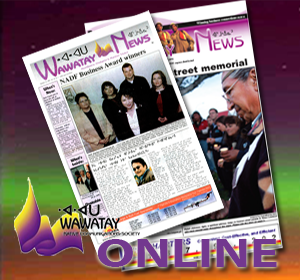The 2012 Metis Nation of Ontario (MNO) elections saw Gary Lapinski re-elected as acting president for the organization with 82 per cent of the vote. Gary Lapinski talked to Wawatay News about the challenges Metis face, what his platform is, and why he chose to run for a second term in the MNO.
WWT: What is your role as Metis president?
GL: The president is expected to represent Metis citizens throughout the province, to listen to their needs and wishes prior to the election and to fully work and advocate for them during their term of office.
We’re also responsible for running the business or administration of the MNO. We have approximately 150 staff that work across the province of Ontario that work in various programs and services on behalf of Metis citizens across the province. So, making sure that those services are continued to be there for our citizens and to build and expand on them as well so it’s a pretty full schedule for MNO’s president, no doubt – and then represent the MNO.
We work with both levels of government: federal and provincial - certainly we’re part of the Metis Nation and a part of the Metis National Council as well, and so the president also sits at the national level as a member of the board of governors as part of the Metis National Council as well.
WWT: What are some priorities you have for this term?
GL: I would say one of my priorities as we go forward, and certainly one of the priorities within the MNO proper is full recognition of Metis rights within Canada.
That means doing whatever we can do to make improvements, whether its better education results for students, better health opportunities for families, creating better opportunities for our communities as well, pursuing economic development, so Metis people can get into positions, or the ones in business can hopefully expand their businesses.
That’s kind of what I call the social side of the equation. Without question, we’ll do a balance of both those sides. We’ll also be putting a focus on children and youth to encourage them to be the best they can be.
What I mean by that is promoting healthy lifestyles from pre-natal right up to young adulthood, doing whatever we can do within the MNO, working with government partners and private industry and anyone willing to work with us to encourage children at a younger age to see the value in education, particularly carrying on the value of post-secondary, whether its college or university or going into trades. We want to emphasize to youth that education is important and it can have a profound, life-long positive effects. The MNO will be putting an emphasis on supporting and assisting children and youth to be the best they can be.
WWT: Why did you choose to run again?
GL: I chose to run again because I strongly believe in what the MNO is about, and when it boils right down to it, it’s about helping our children, our families, and our communities to improve themselves and be better recognized for their Metis rights.
Without question, we have a lot of unfinished work, and like any government of the people, whether it’s MNO, First Nations, or mainstream government there will always be work in things in front of us to do. We do have a number of worker projects and relationships under development, so we want to see them come into fruition.
WWT: What challenges does the Metis Nation face?
GL: Within the MNO, very often there’s misconceptions about what we are funded, so for instance, very few people recognize people that are serving on Metis councils – those aren’t paid positions, they’re not funded by any government. People are working for the betterment of communities? Those are volunteers.
Nothing at all like how you see First Nations chiefs and bands that get federal and provincial funding – our councils get nothing. It’s dealing with issues like this, and continuing to try and advance our issues and getting the people to recognize that clearly there isn’t a level playing field when it comes to dealing with and assisting Metis issues.
Having said that, we’re not going to let those things hold us back. Metis people are very committed. The people that step up to serve the MNO are committed to making improvements in the lives if Metis citizens throughout the province. With that type of can-do attitude, we’ll succeed.
WWT: What do you see as the future for Metis in Ontario?
GL: I think the future for the Metis people in Ontario is certainly an era of hope and potential as we go forward.
I’m personally quite pleased with the progress we’ve made, particularly in the last four years. In 2008, we signed an agreement with the government of Ontario that took us from an era of denial that we even exist as an Aboriginal people to one of working with us to properly recognize Metis rights and work with the MNO on some of the socio-economic problems. I think particularly, we will continue to take a strong position as we go forward that we’re one of the three distinct Aboriginal people of this country, that we have a very proud and rich history.
We’ve contributed mentally to the building of communities in the province and the country; we just want our rightful place properly recognized in that context. Like any other people, we want our citizens to be able to achieve at least what others in mainstream can in the form of economic standing, health status, education or any other area. Certainly that will be a factor that drives the MNO.
Gold has arrived.










Gold has arrived. Here in the north of Ontario we see vast streams of gold shimmering across the landscape as autumn is here and the the leaves are turning...
I am the product, evolution of many thousands of years as are you. I grew up on the land in the remote far north of Ontario following in the footsteps of my...